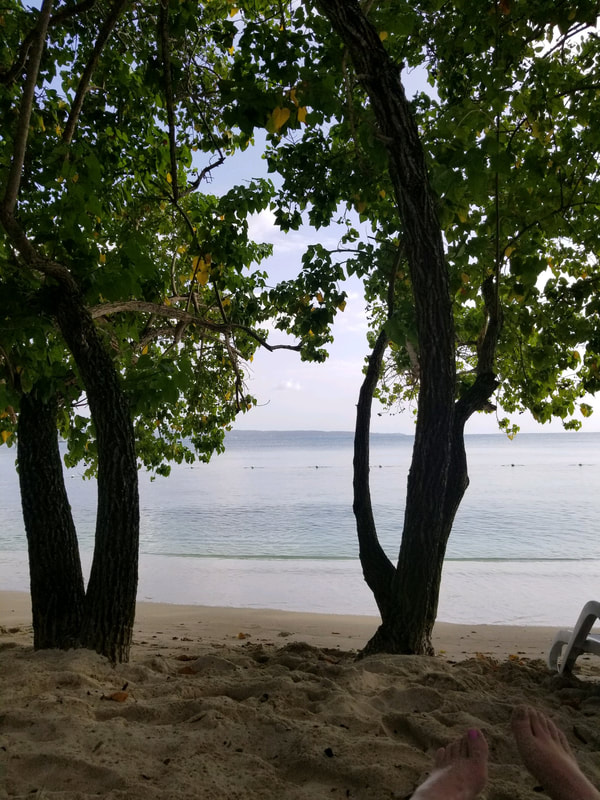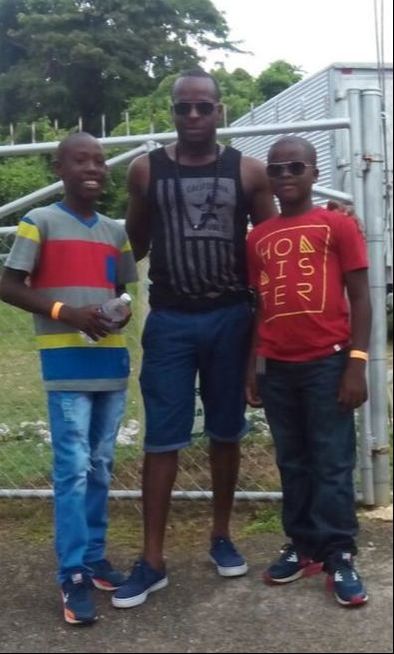|
When I was just 13 years old, I sang in the Middle School choir. One of the songs that was featured in our final spring concert was Jamaica Farewell. This choice was made by the choral director, and she knew exactly what she was doing. We were a gaggle of girls ready for entry into High School. And this particular song promised the thrill of travel to foreign lands, of trying new things, of adventure and intrigue. The lyrics are as follows: “Down the way where the nights are gay and the sun shines daily on the mountain top, I took a trip on a sailing ship and when I reached Jamaica I made a stop.”
Years later I would visit this very island. It did not bear the resemblance to the song. I did not come in on a sailing ship; rather, I flew into Montego Bay. During a trip on a van through the island towards the resort, it became apparent that the people of this country were not living in an idyllic paradise. The lives of Jamaicans were marked by very hard work, toiling under scorching sun to support the island’s two primary industries, agriculture and hospitality. I was dropped off at a luxurious hotel with my boyfriend of many years. The Caribbean Sea could be seen from the open hotel lobby and the breezes off the water eased my worries. I told myself that this was going to be a Harry Belafonte experience. Surely, I could allow myself to relax here. My boyfriend had counseled me on the plane beforehand: “You help a lot of people at home,” he told me. “This week, it is time to help yourself.” We got in our bathing suits and eased into lounge chairs by the ocean. We sipped rum punch. The water off the ocean was kind and warm, so lovely after the harsh winter we had endured back in the Northeast of America. Things were going so smoothly. On the second day of the Jamaican vacation, a lifeguard approached me. His name was Ricardo. Ricardo’s job was to set up lounge chairs, hand out towels, rake the beach of seaweed and pick up empty cups from the rum punch. Ricardo greeted me and my boyfriend in the traditional style of Jamaica: with a fist pump and the word Respect. After our introduction, Ricardo turned and asked me, “Madam, are you okay? You look unwell and worried about something.” Oh no, I thought. A virtual stranger can see right through me. The truth of the matter was that I had been staring out at the ocean with my heart beating out of chest. What was I worried about? Well, I am a homecare physical therapist. My job is to make sure that people can walk safely in their homes, that they do not fall and fracture a hip. What was happening to my patients back home? Were any of them alone on the floor, screaming for help, while I was sitting and relaxing? What about my parents, who are thankfully still healthy? Did they know how much I love them? My boyfriend smirked. He had warned me to try and let go of all of these cares. Yet I had not listened to him. Instead, I had allowed the swirl of cortisol to occupy my body at a time specifically designed for rest. This chemical of cortisol is naturally produced within our bodies and facilitates the daily anxiety which thrusts us out of bed to show up at work, raise children and ensures our very survival on this planet. But what happens when the daily tasks of our jobs and scrubbing floors are removed? The anxiety has no outlet whatsoever. So, it finds us in a lounge chair by the Caribbean Sea.
Ricardo has two boys, named Renaldo and Nicardo. Renaldo is the eldest. He has now turned the very tricky age of 13. While he used to sit at the dinner table and talk to his parents, Renaldo has taken to nodding at his father when he comes home from work. “Evening, Dad,” he says, before quickly retreating into his room. It is just the age, my boyfriend told Ricardo. I have two grown boys and have been through this. They will come back to you one day. Just have patience. We were all teenagers once. The days passed in Jamaica, with Ricardo meeting our every need. I found myself napping quite a bit in the lounge chair, and marveled at the unusual fish in the ocean. The anxiety did not magically slip away in the wind, though. I had been forced to face it head-on. My mantra that week became what Ricardo told me. “Madam, this is not a good way to spend your vacation.” Until one afternoon, when I felt the anxiety leave. Like an angry but resigned beast who could not attack me anymore. Teenagers are known for craving independence. They do not want to be cared for, just as I loathed the thought of my boyfriend, Ricardo and the island of Jamaica taking care of me. I have fashioned my entire life around taking care of people, not the other way around. But teenagers like Ricardo’s son Renaldo still need a father to cook for and look after them, even though they do not know it. I had become ignorant to the fact that I needed somebody to look after me. When it was time to finally leave the island, I had reached a place of deep calm. The food from the land, the sun and the kindness of the native people had worked their magic. Yet I was dismayed to go back home. I recalled the final words of Jamaica Farewell. “But I’m sad to say I’m on my way, won’t be back for many a day, my heart is down, my head is turning around…”
I made a few mistakes that week. The first mistake had been not listening to my boyfriend’s heeding to let go of my troubles. Why is it that we do not listen to those closest to us? Our best friends and confidants witness our every move. They know when we take the right job, buy the wrong house, or speak too harshly to our parents. Our best friends see our deepest selves. But how often do we listen to them, really? Instead, it had taken Ricardo, a virtual stranger until this point, to show me the way back to sanity. This man was so much more than his image of a lifeguard where the sea meets the sand. Ricardo was a father of teenagers. There is no task more daunting than raising them in this fearsome world. My bigger mistake was being blind to Ricardo’s most heroic act of caretaking; to love a creature so well, knowing all the while that you must let them go one day. Loving babies and young children is so easy. Loving teenagers as they walk away from you is another thing altogether. Ricardo hugged me on our last day and we simultaneously said Respect to each other. He also told me that when I return next year he is going to cook me some homemade Jamaican food. That I can even put in a food request, just like his kids do. I am thinking it may be curried goat. “Not a problem, Madam,” Ricardo said as he grinned. “I will be waiting for you and your boyfriend right here.” He pointed to his feet on the sand. This is the beauty of foreign travel. We are given a window into the lives of others, we see the world through the lenses of their eyes. We see the struggles of others, which puts our own woes in a category further way. And through all of this, we grow up. I am no longer a 13-year old girl in a choir singing about Jamaica. I am an adult who knows how hard my own parents worked to give me the life I know today. In the words of Ricardo, “Respect goes two ways. I take care of the visitors from other places, and they allow me to support my family when they come to Jamaica.” Indeed, respect goes two ways. I imagine the teenaged Renaldo someday sitting down to talk to his father over supper, years from now. He will have come back to Ricardo after a very long wait. Ricardo has taught me patience. To wait for relaxation to come after the toil of many months of work. For children to grow past the uncertainty of adolescence. I anticipate the day when I can see Ricardo again, with his feet on the sand and his soul shining through his dark eyes. His eyes will ask, “Respect, Madam. Didn’t I tell you that it was all worth the wait?” Teenagers…they are worth the wait. |
Archives
October 2021
Categories
All
|


